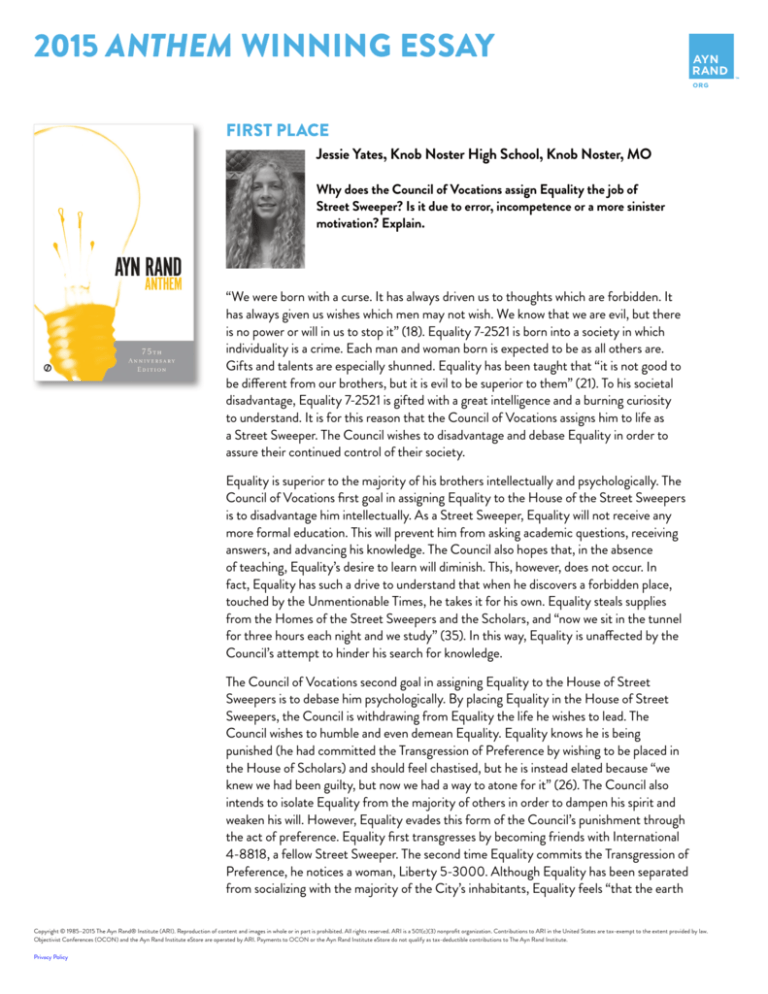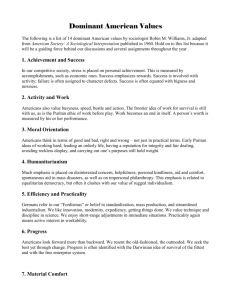
2015 ANTHEM WINNING ESSAY
FIRST PLACE
Jessie Yates, Knob Noster High School, Knob Noster, MO
Why does the Council of Vocations assign Equality the job of
Street Sweeper? Is it due to error, incompetence or a more sinister
motivation? Explain.
“We were born with a curse. It has always driven us to thoughts which are forbidden. It
has always given us wishes which men may not wish. We know that we are evil, but there
is no power or will in us to stop it” (18). Equality 7-2521 is born into a society in which
individuality is a crime. Each man and woman born is expected to be as all others are.
Gifts and talents are especially shunned. Equality has been taught that “it is not good to
be different from our brothers, but it is evil to be superior to them” (21). To his societal
disadvantage, Equality 7-2521 is gifted with a great intelligence and a burning curiosity
to understand. It is for this reason that the Council of Vocations assigns him to life as
a Street Sweeper. The Council wishes to disadvantage and debase Equality in order to
assure their continued control of their society.
Equality is superior to the majority of his brothers intellectually and psychologically. The
Council of Vocations first goal in assigning Equality to the House of the Street Sweepers
is to disadvantage him intellectually. As a Street Sweeper, Equality will not receive any
more formal education. This will prevent him from asking academic questions, receiving
answers, and advancing his knowledge. The Council also hopes that, in the absence
of teaching, Equality’s desire to learn will diminish. This, however, does not occur. In
fact, Equality has such a drive to understand that when he discovers a forbidden place,
touched by the Unmentionable Times, he takes it for his own. Equality steals supplies
from the Homes of the Street Sweepers and the Scholars, and “now we sit in the tunnel
for three hours each night and we study” (35). In this way, Equality is unaffected by the
Council’s attempt to hinder his search for knowledge.
The Council of Vocations second goal in assigning Equality to the House of Street
Sweepers is to debase him psychologically. By placing Equality in the House of Street
Sweepers, the Council is withdrawing from Equality the life he wishes to lead. The
Council wishes to humble and even demean Equality. Equality knows he is being
punished (he had committed the Transgression of Preference by wishing to be placed in
the House of Scholars) and should feel chastised, but he is instead elated because “we
knew we had been guilty, but now we had a way to atone for it” (26). The Council also
intends to isolate Equality from the majority of others in order to dampen his spirit and
weaken his will. However, Equality evades this form of the Council’s punishment through
the act of preference. Equality first transgresses by becoming friends with International
4-8818, a fellow Street Sweeper. The second time Equality commits the Transgression of
Preference, he notices a woman, Liberty 5-3000. Although Equality has been separated
from socializing with the majority of the City’s inhabitants, Equality feels “that the earth
Copyright © 1985–2015 The Ayn Rand® Institute (ARI). Reproduction of content and images in whole or in part is prohibited. All rights reserved. ARI is a 501(c)(3) nonprofit organization. Contributions to ARI in the United States are tax-exempt to the extent provided by law.
Objectivist Conferences (OCON) and the Ayn Rand Institute eStore are operated by ARI. Payments to OCON or the Ayn Rand Institute eStore do not qualify as tax-deductible contributions to The Ayn Rand Institute.
Privacy Policy
2015 ANTHEM WINNING ESSAY
is good and that it is not a burden to live” when he thinks of Liberty 5-3000 (41). The
situation the Council attempted to initiate failed; Equality does not lose his will or his
sense of self.
When Equality was given his life mandate, the Council of Vocations was truly attempting
to preserve the state of their society. Had Equality been rewarded for his various
transgressions, preferences, and passions, the laws of their collectivist society would
have been broken. In the society, each man must be the same, and Equality 7-2512 was
not. The Council had to oppress Equality’s individuality, just as they had to teach each
and every member of their society that “we are nothing. Mankind is all. By the grace
of others we are given our lives. We exist through, by and for our brothers who are the
state” (21). If Equality had been given free rein, or even allowed to go to the House
of the Scholars, he would have certainly made breakthroughs at a rate that the World
Council could not control. Equality’s discoveries would have laid waste to the plans the
World Council held sacred, and this could not be tolerated. The Council of Vocations had
realized that Equality would threaten their society, so they placed him in a position with
little to no influence.
The Council of Vocations used the House of Street Sweepers as a repository for the
unwanted. All those who were thought too weak or too strong to live contentedly
within mainstream society were sent to the House of Street Sweepers. At the House
of Street Sweepers, the weak were unbothered by society and society was unbothered
by the strong. Equality’s greatest strengths and personal qualities were intended to be
restricted and abhorred. Indeed, Equality and his gifts were abhorred, but he found a way
to circumvent each restriction, consciously or not. And, though he maintained use of his
strengths and kept a strong spirit, Equality was never able to permanently influence the
society because, as a Street Sweeper, he was no longer part of the great WE.
The Council of Vocations mandated Equality to life as a Street Sweeper in order to limit
his intellectual opportunities. They placed him in a position where he would be isolated
and likely demoralized. They removed him from a society that he wanted to be a part of.
These actions and purposes are undoubtedly sinister. But the predominant reason? The
Council of Vocations assigned Equality the job of Street Sweeper in order to allow their
collectivist society to continue uninterrupted. Oppressing Equality’s individuality was the
means of achieving that end (making said end sinister as well). The right of the people
to self-advancement was withheld, and the Council of Vocations achieved their ultimate
goal of preserving their society.
Copyright © 1985–2015 The Ayn Rand® Institute (ARI). Reproduction of content and images in whole or in part is prohibited. All rights reserved. ARI is a 501(c)(3) nonprofit organization. Contributions to ARI in the United States are tax-exempt to the extent provided by law.
Objectivist Conferences (OCON) and the Ayn Rand Institute eStore are operated by ARI. Payments to OCON or the Ayn Rand Institute eStore do not qualify as tax-deductible contributions to The Ayn Rand Institute.
Privacy Policy










